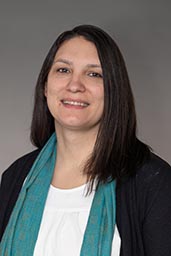
Shadin Atiyeh
Shadin Atiyeh
Degrees and Certifications
Ph.D. in Counselor Education and Supervision from Walden University
M.A. in Community Counseling from Eastern Michigan University
B.A. in Psychology from University of Michigan
B.A. in Arabic, Armenian, Persian, Turkish, and Islamic Studies from University of Michigan
Licensed Professional Counselor, State of Michigan
National Certified Counselor
Approved Clinical Supervisor
Certified Career Counselor
Certified EMDR Therapist
Certified Rehabilitation Counselor
Responsibilities
Responsible for teaching foundational classes within the counselor education program, as well as assisting with program applicant admissions, student advising, and program development.
Area of Expertise
Trauma Counseling
Career Counseling
Multicultural Counseling
Research Interests
Multicultural counseling
Trauma
Refugees and immigrants
Career counseling
Featured publications
Implementation Evaluation of Community-Based Mental Health and Psychosocial Support Intervention for Refugee Newcomers in the United States
Im, H., Verbillis-Kolp, S., Atiyeh, S., Bonz, A. G., Eadeh, S., George, N., & Malluwa Wadu, A. (2023). Implementation evaluation of community-based mental health and psychosocial support intervention for refugee newcomers in the United States. Health & Social Care in the Community, 2023.
Refugee newcomers resettled in the United States face numerous challenges impacting their mental health and overall well-being. Despite extensive research on clinical interventions, multimodal interventions with peer-based group models in resettlement contexts remain scarce. Adopting a realist evaluation approach, this study aims to conduct a comprehensive implementation evaluation of a complex community-based mental health and psychosocial support (CB-MHPSS) group intervention, examining its mechanisms and processes while considering the interplay among context, implementing agents, and community settings. Qualitative and quantitative data on the implementation process were collected from 11 refugee agencies, involving trained resettlement staffers (n = 32) and refugee community facilitators (n = 31) who implemented the 31 CB-MHPSS psychosocial groups in 2021. The analysis included fidelity reports, process reflections, and follow-up survey responses, utilizing a structured template based on the CB-MHPSS Theory of Change (ToC) and Medical Research Council (MRC) guidance. Results of an in-depth exploration of complex relations between context and implementation processes reveal the vital role that adaptability to socio-ecological circumstances during the global coronavirus pandemic played in achieving successful implementation of psychosocial group interventions. Striking a balance between fidelity and refinement of intervention of the intervention curriculum emerged as crucial factors for aligning facilitation goals with newcomer needs. This approach maintained the integrity and appropriateness of the intervention, requiring implementers to utilize local knowledge of community resources and their understanding of lived experience of forced migrants and their within the community. Furthermore, exploring intervention barriers and facilitators revealed merits aligned with program change theories and areas for adjustment, while cataloged guidelines addressed community needs, showcasing competence beyond standard checkboxes. Strategic dissemination guidance provided by the central office in a supportive and nonintrusive manner facilitated uptake in a participatory and context-specific manner. This study emphasizes the importance of leveraging community partnerships and local knowledge to result in sustained improvements in the mental health and well-being of refugees.
Integrating Multicultural Competencies in Ethical Decision-Making with Immigrant Populations, Counseling and Values
Attia, M., Das, B., Atiyeh, S., & Browne-James, L. (2023). Integrating Multicultural Competencies in Ethical Decision-Making with Immigrant Populations, Counseling and Values, 68(1), 1-17.
The aca Code of Ethics (2014) states that counselors are encouraged to utilize an ethical decision-making model to navigate ethical dilemmas. However, the code emphasizes that no specific model is most effective in all scenarios and stresses no endorsement for one model over another. While many models exist, few focus on multicultural ethical decision-making, particularly for working with immigrant populations. This article provides an overview of several ethical decision-making models and utilizes the Multicultural Ethical Decision-Making Model to navigate a scenario involving an immigrant counselor and an immigrant client.
Interpreter-mediated psychotherapy with refugees
Atiyeh, S., Attia, M., & Beckmann, J. (2023). Interpreter-mediated psychotherapy with refugees. Journal of Counseling Research and Practice, 8(1).
Counselors’ competency to counsel refugees: A constructivist grounded theory study
Atiyeh, S., & Gray, G. (2021). Counselors’ competency to counsel refugees: A constructivist grounded theory study. Counseling and Psychotherapy Research, 00, 1–11.
Keywords
Counseling
Multicultural competency
Refugees
The purpose of this constructivist grounded theory study was to explore how counselors perceive their preparedness to counsel refugee clients and how they conceptualise multicultural competence when doing so. Although the findings point to the complexity and challenges involved when counseling refugees, all participants emphasised the ethical imperative to do so. Therefore, counselors are able and obligated to contribute to the health and wellness of refugees through providing integrated and holistic approaches.
Considerations for facilitating refugee acculturation through groups
Atiyeh, S., Choudhuri, D. D. & Dari, T. (2020). Considerations for facilitating refugee acculturation through groups. The Journal for Specialists in Group Work.
Globally, there are 70.8 million forcibly displaced people made up of 41.3 million internally displaced, 25.9 million refugees, and 3.5 million asylum seekers. Refugees have significant mental health needs and face multiple barriers to obtaining adequate mental health care. The acculturation process can complicate and exacerbate mental health symptoms. In this article, the authors discuss relevant cultural factors and present possible group interventions to address acculturation with refugee groups.
Publications
Atiyeh, S., & Gray, G. (2021). Counselors’ competency to counsel refugees: A constructivist grounded theory study. Counseling and Psychotherapy Research, 00, 1–11.
Atiyeh, S., Choudhuri, D., & Dari, T. (2020). Considerations for facilitating refugee acculturation through groups. The Journal for Specialists in Group Work, 45(4), 353-366. https://doi.org/10.1080/01933922.2020.1800879.
Courses taught by Shadin Atiyeh
Winter Term 2025 (current)
Fall Term 2024
Spring-Summer Term 2024
Winter Term 2024
Fall Term 2023
Spring-Summer Term 2023
- CED7205 - Foundations of Rehabilitation Counseling
- CED7235 - Rehabilitation Counseling Professional Roles